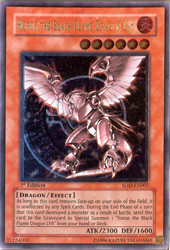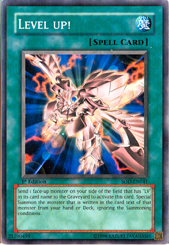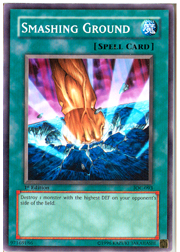This week, we continue our game revision discussion with a look at monsters that have a special immunity against spell cards. Every duelist will encounter monsters that have these effects, but some will not be prepared for them. When faced with these situations, many players call upon judges for guidance and sometimes receive a strong dose of “you darn kids . . . ”
. . . Okay, they probably don’t face the last part.
Spell Card Immunity?
What does it mean for a monster to have “spell card immunity”? Does it mean that spell cards can never harm those monsters? Will that immunity protect those monsters while they are in your hand or in your deck?
 Monsters with spell card immunity, like The Legendary Fisherman and , often contain the text, “this card is unaffected by Spell Cards.” This is more accurately expressed by saying that the monster “is unaffected by the effects of spell cards.” Does this sound a bit confusing? Well, don’t fret—many a judge before you has been at the receiving end of this one.
Monsters with spell card immunity, like The Legendary Fisherman and , often contain the text, “this card is unaffected by Spell Cards.” This is more accurately expressed by saying that the monster “is unaffected by the effects of spell cards.” Does this sound a bit confusing? Well, don’t fret—many a judge before you has been at the receiving end of this one.
Don’t think this confusion is limited only to field interactions. Sometimes players will be hit with Delinquent Duo, then turn to a judge and ask, “Will this monster not be discarded because it’s unaffected by spell cards?” Monsters that are “unaffected by the effects of spell cards” are only protected while they are face-up on the field. Anything that a spell card does to those monsters while they’re in your hand, your deck, your graveyard, or removed from play is fair game. This means cards like Delinquent Duo, Confiscation, and Card Destruction will cause these monsters to be discarded.
You can also use cards like Premature Burial to special summon these types of monsters from your graveyard. Any spell card that interacts with the graveyard won’t be held back by these cards’ effects. Feel free to remove them from play with Soul Release as well. But, keep in mind that these cards can still be affected by spell cards while they’re removed from play, so they can certainly be brought back to the field by using Dimension Fusion.
Monsters with spell card immunity typically have continuous effects that are “on” while the monster is face-up on the field. If you were to tribute summon Silent Swordsman LV5, it would be unaffected by your opponent’s Stumbling and Level Limit – Area B, which saves it from going into defense position. If your opponent had Swords of Revealing Light or Messenger of Peace on the field, your Silent Swordsman LV5 would still be able to attack.
Immunity to spell cards only protects the monster with that particular effect. It does nothing for the player that controls the monster, nor does it help any of the other monsters that the player currently has in his or her monster zone. If my opponent equips my spell card–immune monster with Snatch Steal, Snatch Steal will fail to take control of my monster, because the monster is unaffected by the effects of spell cards. However, I can still receive the benefit of Snatch Steal’s life point gain effect, because that effect does not affect my spell card–immune monster.
Cost Vs. Effect
Being unaffected by the effects of spell cards still has its limitations. It’s still possible for spell cards to remove a face-up spell card–immune monster from the field, despite that monster’s inherent protection from spell cards. Immunity from the effects of spell cards does not protect the monster from being used to pay the cost of spell cards!
Why is that the case? A player must pay the cost of a spell card in order to activate its effect, but that payment is not actually part of the spell card’s effect. The monsters with spell card immunity aren’t protected from the payment of the card’s effect. For some spell card–immune monsters, this can be very helpful.
 Horus the Black Flame Dragon LV6 has the spell card–immune effect. Normally your opponent’s spell cards won’t be able to stop it. But while it’s nice to have Horus around in its LV6 form, it can be much better to have it around in its more powerful LV8 form. The easiest way to achieve this is to use Level Up!, which tributes Horus the Black Flame Dragon LV6 so you can special summon Horus the Black Flame Dragon LV8.
Horus the Black Flame Dragon LV6 has the spell card–immune effect. Normally your opponent’s spell cards won’t be able to stop it. But while it’s nice to have Horus around in its LV6 form, it can be much better to have it around in its more powerful LV8 form. The easiest way to achieve this is to use Level Up!, which tributes Horus the Black Flame Dragon LV6 so you can special summon Horus the Black Flame Dragon LV8.
But why does this work? After all, Horus the Black Flame Dragon LV6 is unaffected by the effects of spell cards, right? It certainly is, but sending Horus the Black Flame Dragon LV6 to the graveyard is a cost to activate Level Up!. It will not stop me from sending it to the graveyard to pay that cost, and I’ll be rewarded with the more powerful Horus the Black Flame Dragon LV8.
What if I wanted to use Enemy Controller? Enemy Controller has two effects, but which one will work? The first effect switches the battle position of an opponent’s face-up monster. The other effect requires you to tribute a monster you control so you can take control of an opponent’s monster for a turn.
So what’s your clue? The second effect is the one that has a cost. That tells you it can be paid for with a monster that has spell card immunity. However, both effects will not work on an opponent’s face-up monster that has spell card immunity. While it may be possible for you to tribute a spell card–immune monster to pay the cost, you can’t expect the effect to take control of a spell card–immune monster.
Ectoplasmer is another tricky one. During the end phase of each turn, the turn player is forced to tribute a monster and inflict damage to their opponent equal to half of the tributed monster’s original ATK. It can actually be somewhat beneficial for your opponent to tribute his or her monster each turn, but what if you don’t want to do the same? To avoid this setback, you should rely upon the strength of your spell card–immune monsters!
The tribute for Ectoplasmer is actually performed when the effect resolves, and thus it’s not a cost. Because of this, it’s possible for you to choose your spell card–immune monster for Ectoplasmer’s effect, knowing that you won’t tribute it because the monster is unaffected by the effects of spell cards. However, this might sound a bit odd. If the monster is unaffected by spell cards, why would Ectoplasmer even acknowledge that monster’s presence?
Sought by the Spell
Monsters that are immune to spell cards are not completely invisible to them. Spell cards will still recognize the presence of these monsters on the field and will sometimes attempt to interact with them. This can even result in the effect of the spell card failing completely.
 Smashing Ground is a good and inexpensive way to destroy an opponent’s monster. But what happens when the monster with the highest DEF is unaffected by the effects of spell cards? What will Smashing Ground do then?
Smashing Ground is a good and inexpensive way to destroy an opponent’s monster. But what happens when the monster with the highest DEF is unaffected by the effects of spell cards? What will Smashing Ground do then?
Let’s suppose my opponent has Silent Swordsman LV5 and Gemini Elf face up on her side of the field. If I activate Smashing Ground, it will attempt to destroy the monster with the highest DEF on my opponent’s side of the field, and that monster is currently Silent Swordsman LV5. But the Swordsman is unaffected by the effects of spell cards.
Some players think that perhaps Smashing Ground will skip over Silent Swordsman LV5 and destroy Gemini Elf instead, but that is not the case. Smashing Ground knows that Silent Swordsman LV5 has the highest DEF, so it will still attempt to destroy it. Because Silent Swordsman LV5 is unaffected by the effects of spell cards, Smashing Ground’s effect fails and cannot destroy the Swordsman.
Then we have our last card for the day, which is Creature Swap. Like the example of Ectoplasmer, Creature Swap can attempt to go after a monster unaffected by spell cards and fail to do anything with it. In Creature Swap’s case, because the monster is unaffected by spell cards and cannot be exchanged, the opponent’s monster remains on their side of the field and no exchange occurs at all. This can be great when you want to escape from an opponent’s Creature Swap and still retain your monster.
Until next week, send all comments to Curtis@metagame.com